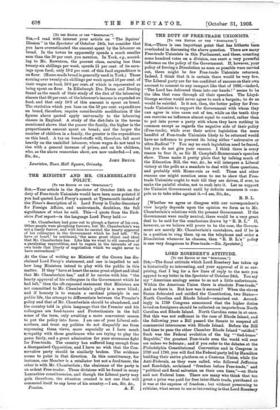THE DUTY OF FREE-TRADE UNIONISTS.
[To THE EDITOR OP THE " SPECTATOR."
SI11,—There is one important point that has hitherto been overlooked in discussing the above question. There are many Free-trade Unionists in this Parliament, and these, counting some hundred votes on a division, can exert a very powerful influence on the policy of the Government. If, however, your policy of forcing a Dissolution as soon as possible were carried out, there might be few Free-trade Unionists returned. Indeed, I think that it is certain there would be very few. The Liberal party are far too confident of success on their own account to consent to any compact like that of 1886,—indeed, " The Lord has delivered them into our hands ! " seems to be the idea that runs through all their speeches. The Lloyd. George section would never agree to such a bargain ; to do so would be suicidal. Is it not, then, the better policy for Free- trade Unionists to support the Government with whom they can agree in nine cases out of ten, while on the tenth they can exercise an influence almost equal to control, rather than to put into power a party with whom they have nothing in common except as regards the negative side of their policy (Free-trade), while over their active legislation the mere handful of Free-trade Unionists likely to be returned would have no influence to prevent its being either " subversive or ultra-Radical " ? You say no such legislation need be feared, but you do not give your reasons. I think there is every reason to fear it, as Sir H. Campbell-Bannerman's speeches show. These make it pretty plain that by talking much of the Education Bill, the war, &c., he will interpret a Liberal victory at the polls as a mandate to deal with these questions, and probably with Home-rule as well. These and other reasons one might mention seem to me to show that Free- trade Unionists ought to wait till they are driven, if ever, to make the painful choice, not to rush into it. Let us support the Unionist Government until by definite measures it com- pels us to take sides against it.—I am, Sir, &c.,
R. B. L.
[Whether we agree or disagree with our correspondent's view largely depends upon the opinion we form as to Mr. Chamberlain's relations with the present Government. If the Government were really neutral, there would be a very great deal to be said for the conclusions drawn by " R. B. L." If, however, as we believe will prove to be the case, the Govern- ment are merely Mr. Chamberlain's caretakers, and if he is in a position to ring them up on the telephone and order a Dissolution whenever he chooses, then "R. B. L.'s" policy is one very dangerous to Free-trade.—En. Spectator.]


















































 Previous page
Previous page